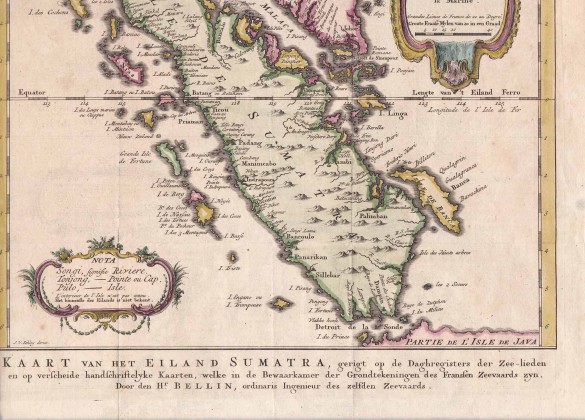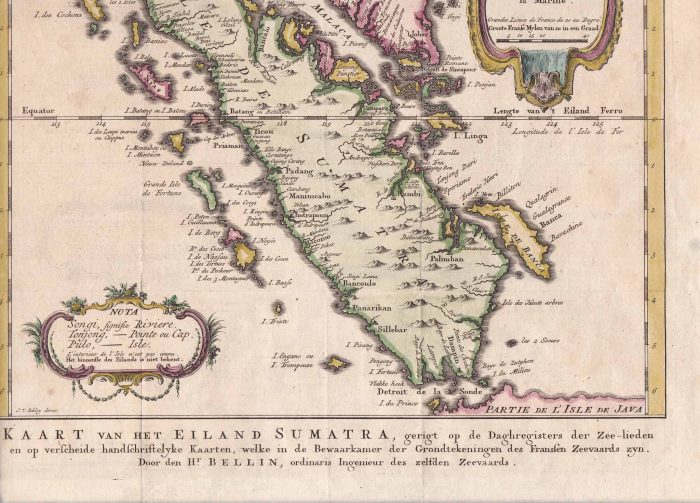
At first sight Bengkulu seems an odd place for a trading post. It’s situated on the west coast of Sumatra, maybe three quarters of the way down the mammoth island.
Head due west and you won’t hit landfall until north of Zanzibar in West Africa. For the East India Company, that early London based multinational looking east, it seems a very strange choice indeed but in the early 18th Century this small isolated port in the whole of the Spice Islands. They had retreated with their tails between their legs after the Dutch had kicked them out of Banten towards the end of the previous century.
The British had been touching base here since the 1600’s, buying pepper and trying to offload Indian silks but cut off from the main trading routes by first the Portuguese and then the Dutch. They called it Fort York and they had some 300 kilometres of relatively friendly coast to themselves. Hardly surprising of course, Bengkulu was remote from the main spiceries but for decades the British stubbornly plodded along there while looking for a way back into the main area where they could link their India and China trade. They would of course eventually find Singapore but that was a century away and would come only after other such islands had been looked at, not least Penang. And of course the man who is credited with founding Singapore, Stamford Raffles, spent several years in this outpost bemoaning his fate and upsetting the Dutch. The climate was malarial and the traffic was insufficient to lure the smarter traders: it became a warehouse for the washed up and the desperate.
One such individual was appointed Joseph Collett who was appointed Governor in 1712. This guy was a Baptist with a coterie of women and a knack of finding himself in debt. So desperate the poor man must have been, he scrimped and scrounged the necessary money to secure the position (much as senior police officers do today allegedly) but his dream came true and he became lord over all he surveyed. Which wasn’t a lot!
Still, he kept busy. He replaced Fort York with a more sturdy Fort Marlborough and was even showing a profit after a couple of years. This didn’t stop him bemoaning the ‘quality’ of people who were sent to the outpost. Mr. Ballard drank himself to death within a few weeks of arriving there while some guy called Eaton, no doubt upon hearing less than flowery accounts of his new posting was arrested for mutiny, piracy and murder even before he’d landed.
Collett must have impressed his masters back in London for after seeing out 4 years he was transferred to Madras, a more than suitable position for this one time bankrupt. Bengkulu failed to prosper and within months head office was bemoaning the lack of pepper shipments, its supposed raison d’etre. There were tales of woe from the Bengkulu traders aplenty and matching retorts from London: oh how those traders must have hated mail day! One report stated trouble with the natives. There was no sympathy from London; London replied that oppression ‘though it lie and fester awhile will at last break out into a dangerous if not incurable sore.’ Promises were made of fine new plantations being developed but as ship after ship returned empty ‘good words will no longer go down well with us’ roared across the oceans, the venom all too clear.
A particular target for London, as if the lack of pepper wasn’t enough, was the drinks bill, something familiar no doubt to many a CEO today. Collett had boasted how he’s turned rampaging, beer guzzling delinquents into angelic cherubs who never missed church services and were tucked up in bed by 10 pm. The saintly Collett must have had some leaving do if the drinks consumed in his final month is anything to go by. The total from this July 1716 bender far exceeded the export of pepper for the previous 12 months and it is a no brainer to imagine the rage as the Finance Officer dictated the following:
74 dozen and a half bottles of claret, 24 dozen and half Burton Ale and Pale beer, 2 pipes and 42 gallons of Maderia wine, 6 flasks of Persian wine, 274 bottles of toddy, 3 Leaguers and 3 quarters of Batavia arrack and 164 gallons of Goa toddy
Consumed by 19 people in one month! Kind of puts Pressure Hour in the shade! Little wonder that the Company replied ‘It is a wonder to us that any of you live six months and that there has not been more quarrellings and duellings amongst you’.
Bengkulu wasn’t the only place of course in the archipelago where alcohol was not just freely available but joyfully imbibed by expats far from home.
The port city of Banten, a couple of hours west of Jakarta had a small British trading community based there who would often get into brawls with drunken visiting Dutch sailors carousing through the narrow lanes.
The Bantenese, unused to the subtleties and nuances of European nation states would tar all Europeans with the same brush and British protestations that it was the dastardly Dutch who started the fighting fell on deaf ears. In their eyes the Europeans were all the same.
Tired with forever pleading their innocence, the British community had a brainwave. They decided to hold a celebration on Queen Elizabeth I’s birthday and they paraded through the Banten streets celebrating the monarch and their nation. The Bantenese were curious. They had their own monarch who they respected deeply, the remains of his kraton can still be seen, and they looked on the Europeans in a new light and with a new respect. But, they wondered, why were only some of the white people celebrating? This was the opportunity the British were looking for. They explained that they were from two different countries and that they, the British, respected their monarch as the Bantenese respected theirs. The penny dropped and the local people followed the procession chanting ‘British good, Dutch bad’.




